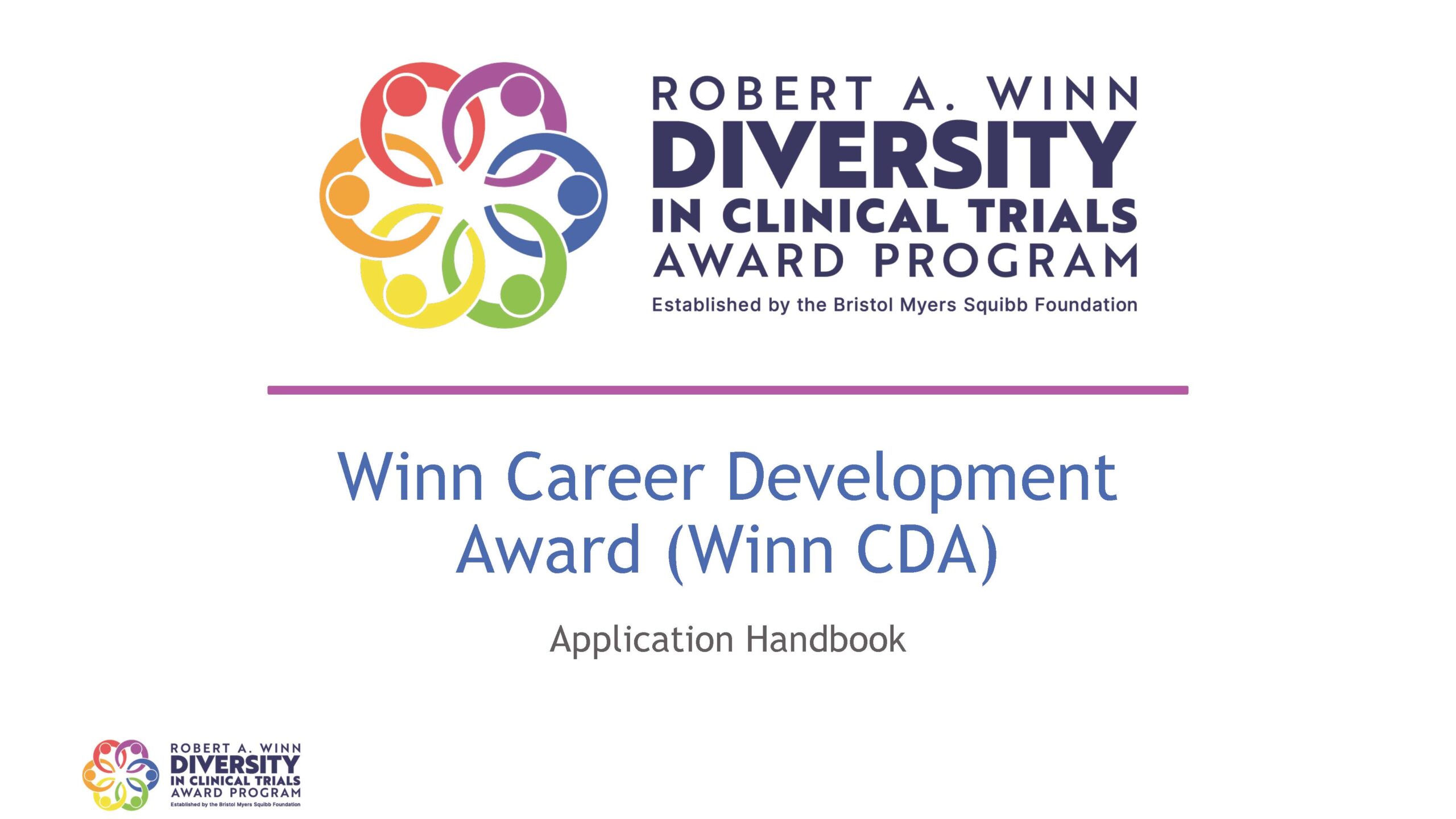Robert A. Winn Excellence in Clinical Trials: Career Development Award (Winn CDA)
Expanding Diversity in Clinical Trials
Those participating in clinical trials should resemble the people who are most likely to get the diseases being studied. Right now, that’s not happening. Despite representing a large portion of the U.S. population, only a small portion of underrepresented communities are involved in clinical trials. Winn CDA looks to change this.
Making these trials more diverse isn’t just a nice idea, it’s a powerful tool for making healthcare better for everyone. It helps us learn how new medicines work for different people, and tailor treatments to them. It also gives us a range of data that can help doctors make better choices when treating patients. Finally, it’s a crucial step toward making healthcare more equitable.
Program Overview
The Robert A. Winn Excellence in Clinical Trials: Career Development Award (Winn CDA), supported by the Bristol Myers Squibb Foundation, is a 2-year program designed to support the career development of early-stage investigator (as defined by NIH) physicians from diverse backgrounds, and physicians who have a demonstrated commitment to increasing diversity in clinical research, to become independent clinical trial investigators who are engaged in advancing health equity through their research and mentoring. Currently, our clinical research areas include cancer, cardiovascular disease and immunologic disorders.
The Winn CDA offers a comprehensive and integrated approach to increasing diversity in clinical trials through workforce development and mentoring.
Award
The Winn CDA provides $120,000 annually for two years to institutions sponsoring scholars. The funds are expected to cover a percentage of each scholar’s salary, equivalent to 40% of their time. Scholars are required to receive mentorship from a seasoned clinical investigator at a clinical trial site or institution and are expected to actively participate in their mentor’s clinical trial, which must meet the FDA Clinical Trial Definition. Scholars aren’t expected to run their own trials.
Program Details
The program kicks off with a virtual orientation in October and an in-person 4.5-5-day intensive workshop titled the Robert A. Winn Excellence in Clinical Trials: Design and Implementation of Clinical Trials in partnership with the American Association for Cancer Research® (Winn-AACR DICT Workshop) in November 2025 (dates TBA). The workshop imparts essential knowledge about clinical trials design, development, implementation, and community engagement.
Scholars then participate in a two-year Community-Oriented Clinical Trialist (COCT) curriculum that offers thorough training in clinical research design and community engagement methods. The curriculum includes weekly or bi-weekly scholars forums, community engagement assignments, and a capstone project where scholars develop a mentored research protocol.
To guide their training activities, every scholar crafts an Individual Professional Development Plan (IPDP) based on a skills assessment and in collaboration with their mentor. As part of the program’s tiered mentoring model, scholars also mentor medical students during the summer of their first year as part of the Winn Clinical Investigators Pathway Program.
At the end of each year, scholars attend the Winn CDA Annual Convening, a two-day event held every November. The event features sessions on diversity in clinical research and skills development, along with scholar capstone presentations. This is a meaningful opportunity to jumpstart a career on the frontlines of health equity, but it does require commitment. In addition to their time dedicated to learning in the program, scholars are expected to submit biannual status reports and annual funding reports.
Mentor Requirements
Mentorship is a critical aspect of the Winn CDA. Mentors provide guidance on career and professional development with a particular focus on challenges, opportunities, and strategies for researchers from underserved backgrounds. Through this process, mentors will share personal experiences that have influenced their career pathways.
Mentors will engage scholars in actively conducting an existing clinical trial and provide exposure to all aspects of clinical trial administration and implementation. It is estimated that the mentorship will consist of 75% clinical trial activities and the remaining 25% of mentors’ focus will be on career, personal, and professional mentoring.
Mentor/scholar interaction requirements include at least four meetings per month, of which three will be related to clinical trial research related activities.
Frequently Asked Questions
These are the therapeutic focus areas of the program funding partners. The strategy of the partners is to fund innovative demonstration projects in these areas.
Clinical research is necessary to generate evidence for the efficacy and safety of new therapies and some subgroups of patients may respond differently to medical therapies. There are many dimensions of diversity, including demographic and non-demographic characteristics, that may impact how different patients respond to medicines. Diversity of clinical trial participants is needed to help ensure that the trial population is representative of the patients who will use the medicine or medicinal product and ensure that the results are generalizable. Further, clinical trial diversity advances equity in provision of health care and accuracy of ethnicity-specific subgroup analyses.
The two-year Robert A. Winn Diversity in Clinical Trials: Community-oriented Clinical Trialist Training (Winn COCT Training) will be delivered in a variety of formats (e.g., didactic lectures, practical workshops, expert panels, and roundtable community discussions). Additionally, it will provide comprehensive training in clinical research design, funding, and implementation, and in trauma-informed community engagement methods and strategies. An intensive six-day training in clinical research, designed and hosted by the American Association for Cancer Research (AACR), will precede and set the foundation for the Winn COCT Training.
Ultimately the goal of Winn CDA is to improve health equity by improving healthcare for underserved and vulnerable people. This program will tackle the challenge by: working within communities; establishing a career development program to support Early-Stage Investigators (ESI) URiM, or those with a demonstrated commitment to diversity in clinical trials; and building a pathway of diverse healthcare workers (through an investment in diverse medical students). All of these aims will help increase the number of underrepresented patients who participate in clinical trials. More participation by underrepresented groups in clinical trials will help healthcare providers to better treat the diseases that impact them.
If mentor changes are required, please email the Winn CDA team to see how to best proceed at winncda@vcu.edu.
Primary Mentors must hold an MD, DO, MD/PhD, or DO/PhD. Mentors from an academic institution must hold a position as an associate or full professor. Mentors are expected to be established Clinical Investigators with an active clinical trial that the scholar can work on during the two-year program period.
While physicians from groups underrepresented in medicine are highly encouraged to apply, you do not have to fall under the URiM population to participate in this program. If you have a demonstrated commitment (reflected in your CV or past publications) to increasing diverse patient populations in clinical trials, you may be eligible to apply.
Eligible candidates will need to be US Citizens, Lawful Permanent Residents (LPRs) as defined by the US Department of Homeland Security or hold a H-1B or O-1 Visa. The Visa must be valid during the full program period.
Yes! Mentors are invited to a virtual orientation shortly after the program begins.
The mentor’s stipend is not included in the $120k/yr. You do not have to include the mentor’s stipend in your budget.
The mentor is expected to dedicate 6-hours per week to clinical trial mentoring on one or more trials.
Although we are grateful to the support you receive from your mentorship team and other secondary mentors, only the primary mentor is compensated for their time.
New or early stage investigators are eligible to apply for the Winn CDA program. As defined by the National Institutes of Health (NIH), a new investigator has completed his or her terminal research degree or medical residency—whichever date is later—within the past 10 years and has not yet competed successfully for a substantial, competing NIH research grant. Applicants with an RO1 or RO1 equivalent are ineligible.
No. Candidates must hold the degree of either: MD, MD/PhD, DO or DO/PhD only.
Yes, 40% of the scholar’s FTE should be dedicated to research. If there are other research projects that already have a substantial amount of their time taken up, the scholar may not have time to participate in this program.
Scholars should meet with their mentors once a week (four times a month). Ideally, three of those meetings should occur as in-person meetings to facilitate open discussions and strong relationship building.
The following are current guidelines, but they are not definitive and will continue to evolve:
- The expectation is that 40% (roughly two days a week) of the scholar’s time should be allocated (protected) to participate in Winn CDA-related activities. The specific schedule may vary based on individuals’ situations. Time working with the mentor on his/her clinical trial and other mentoring activities will be determined between each mentor and mentee.
- The schedule may be different for each cohort. For example, there will be an intensive six-day training toward the beginning of the program (year 1 only), there will be an Annual Convening, a series of webinars/learning days, and other activities. Currently, the first cohort meets virtually on a bi-weekly basis (every other Friday).
Yes, your mentor will receive a $4,800 stipend each year of the program.
Not necessarily. Although ideal, your mentor can be at another institution. Please be sure to update the Winn CDA team with any institution changes for your mentor along with updates to contact information as they occur by emailing winncda@vcu.edu.
The scholar will need admitting rights to whatever institution that is associated with their mentor’s clinical trial.
Yes, applicants who are doing global clinical trials can apply as long as they are employed by a US institution, and meet all other eligibility criteria.
Each scholar shall be mentored by an experienced clinical investigator at an established clinical trial site and participate substantively in the mentor’s active clinical trial. It is not expected that the scholar will have their own clinical trial, although some may.
Yes, each scholar can have more than one mentor; however, only one mentor will receive the honorarium and only one mentor letter and biosketch should be included with the application.
How to apply?
The full application for Cohort 5 will run from January 6, 2025 through May 12, 2025. The application, which includes all required and supplemental application documents, must be submitted electronically through the Application Portal. The application deadline is May 12, 2025 at 11:59 PM ET. Incomplete applications and late submissions will not be accepted.
The application review and selection process will take place from May 13, 2025 through early August 2025. Each application will be reviewed by at least two members of the Winn CDA Review Panel. Final selections will be recommended by the Winn CDA Selection Committee and officially approved by the Executive Committee. Award notifications will take place in early August 2025, which will initiate the official contracting/award agreement process. The public announcement of the Winn CDA Cohort 5 scholars will take place in early-October 2025. The Winn CDA Cohort 5 will kick-off in mid-October 2025.
If you have any questions, please contact the Winn CDA team.


